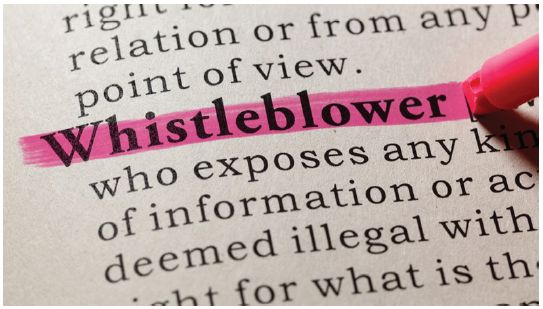Executive Summary
In the rst of two articles on the whistleblowing landscape, Sean Curran considers how things might change in the UK in the wake of the country's departure from the EU.

Now that the UK has left the EU, pharmaceutical companies will be keen to nd out the likely direction of travel of the country in terms of future whistleblowing legislation.
There are two big questions for companies with signicant operations in the UK and across the EU. Will the UK's post-Brexit whistleblowing regime remain closely aligned with that of the EU, or will the UK shift towards a US style-model? This rst of two articles looks at the current situation in the UK and examines how things might change post-Brexit; it explores how the current law compares to the new EU directive on whistleblower protection and considers whether there may be some appetite for a more US style approach. The second article will cover how to implement a whistleblowing corporate policy.
The New EU Directive
The new EU Whistleblower Protection Directive – the directive on the protection of persons who report breaches of European Union law – aims to harmonize across member states the protection that is given to those who blow the whistle on alleged corporate wrongdoing.
The directive came into force in December 2019, but member states do not need to implement the legislation until December 2021. From that point, the EU will have a single harmonized regime for protecting whistleblowers and dealing with their allegations. In the meantime, the protection available to whistleblowers varies considerably across the EU from country to country.
The Whistleblower Protection Directive reects a general global compliance trend towards safeguarding whistleblowers, incentivizing them to come forward and giving them greater anonymity. It also stipulates that companies must have safechannels for reporting whistleblowing.
Of particular relevance to pharmaceutical companies is the fact that the directive lays down minimum standards of protection for the whistleblower in relation to product safety, public health, consumer protection and competition.
The US False Claims Act and Department of Health and Human Services Inspector General regime encourage whistleblowing more actively than either the existing UK regime or the new EU directive, and in particular includes powerful nancial incentives for whistleblowers who come forward. If the UK were to align itself with the US rather than the EU, this would represent a signicant change in the environment.
The UK Situation Now
UK law encourages all companies to have internal systems in place through which employees can blow the whistle. Unlike the new Whistleblower Protection Directive, however, it does not make having such systems a legal requirement.
The current UK law on protection for whistleblowers is mainly found in the Employment Rights Act 1996 (ERA), which incorporates the salient provisions of the Public Interest Disclosure Act 1998 (PIDA). The legislation is backed up by a considerable body of case law. It gives workers the right to bring a claim of automatic unfair dismissal if they are red after blowing the whistle, and also provides other protections for those who subsequently suffer detrimental treatment from their employers, such as being passed over for promotion or training.
However, whistleblowers are only protected under UK law if they can be shown to have reasonably believed that they were acting in the public interest and if what they disclose indicates past, present or likely future wrongdoing by the company in question. What is meant by "public interest" has been signicantly limited by recent court cases: the belief must be genuine and it must be reasonably held.
Such wrongdoing must fall into one or more of the following categories: criminal offences such as fraud, failure to comply with a legal obligation, miscarriages of justice, endangering health and safety, and damage to the environment. A complaint that there has been a deliberate cover-up of these kinds of wrongdoing also attracts whistleblower protections, provided the other tests are met.
Of course, the whistle may be blown on a company by somebody who does not work there, and there is increasing pressure on the UK government to expand the protection available for external whistleblowers.
However, current UK law is based around the assumption that it is workers making complaints about their own employer who are the most vulnerable after making a disclosure.
The current UK legislation also does not provide nancial incentives to whistleblowers in the way that US legislation does. In the US, whistleblowers are entitled to receive between 10% and 30% of any ne levied on an organization as a result of the information they give the authorities. This powerful incentive has led to the False Claims Act becoming one of the most heavily litigated areas of law in the US. Lisa Osofsky, director of the UK's Serious Fraud Ofce, has advocated for a more US style approach to investigations, including the ability to "ip" insiders in companies. Osofsky appears to want investigators to have greater means to persuade insiders to cooperate with the SFO.
From a compliance perspective, all pharmaceutical companies in the US are expected to maintain internal compliance hotlines to facilitate reporting of employee concerns, but under the US regime whistleblowers are heavily incentivized to le a lawsuit in order to seek government intervention and enforcement, and to receive a portion of any recovery.
The UK regime encourages people to report wrongdoing directly to the company, because of the protections afforded by the ERA and PIDA. The assumption in the UK is that an employment tribunal dealing with a complaint by a whistleblower about discriminatory treatment from their employer can then pass on details about the case to the regulators, if that person consents to them doing so. While this is the norm, there are circumstances where the worker can go direct to a regulator who has legal responsibility for the matter in question. There are also very limited circumstances where a whistleblower can make a report directly to a government minister.
Further aeld, in countries such as India and China, legislation has been enacted within the past decade to bring more protection to whistleblowers. Elsewhere, there have been recent attempts to improve whistleblowing laws. Australia recently updated its regulatory guidance to allow whistleblowers to maintain their condentiality.
The deadline for EU member states to implement the Whistleblower Protection Directive into their national laws is 17 December 2021, although the directive will not apply to companies with 50-249 workers until December 2023. It remains to be seen what direction the UK will take now that it has left the EU.
Upholding the EU's standards on whistleblowing could well be made a condition of the trade deal which the UK has pledged to reach with the EU by December 2020. Some of the Whistleblower Protection Directive's principles are already contained in UK legislation, and it is unlikely that the UK will allow itself to fall behind the rest of the EU, even post Brexit. While investigators such as Osofsky would probably welcome a more US style approach, it looks more likely that the UK will evolve its laws to stay in line with the rest of the EU. The new Whistleblower Protection Directive is likely to form the basis for what that alignment might look like.
The content of this article is intended to provide a general guide to the subject matter. Specialist advice should be sought about your specific circumstances.
